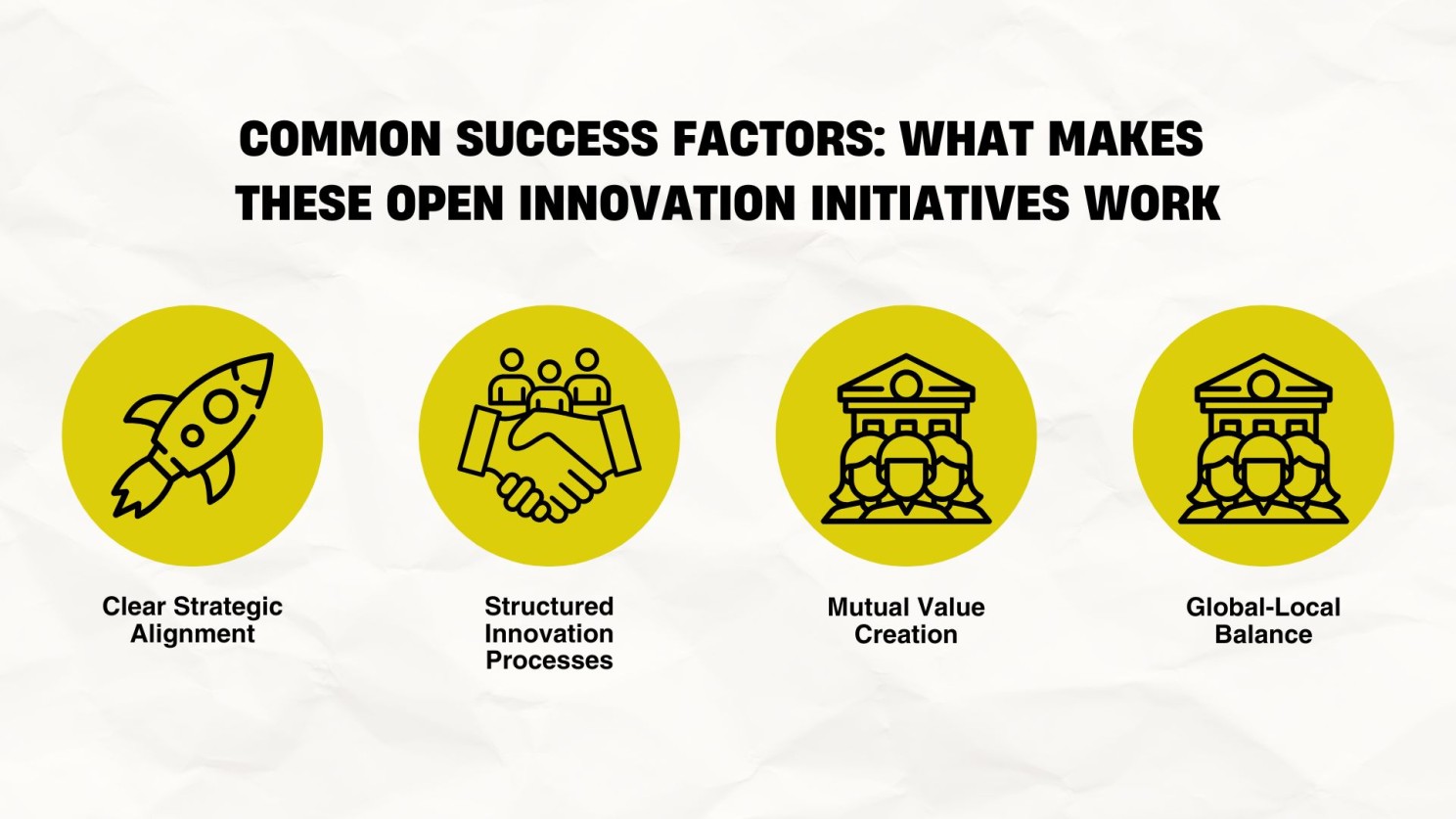Synopsis: This article examines three remarkable open innovation case studies from the automotive industry, showcasing how Mercedes-Benz and Hyundai Motor Group have successfully collaborated with startups to solve complex challenges and drive innovation. These partnerships demonstrate the tangible benefits of open innovation strategies in enhancing navigation systems, advancing future mobility technologies, and fostering regional startup ecosystems.
Did you know that automotive companies that implement open innovation strategies bring new technologies to market 2.3 times faster than those relying solely on internal R&D? As the automotive industry undergoes unprecedented transformation, leading companies like Mercedes-Benz and Hyundai are turning to open innovation to accelerate technological advancement and maintain competitive advantage. Rather than developing everything in-house, these industry giants are strategically partnering with agile startups to solve complex challenges and create mutual value.
But what makes these collaborations successful? And how can other companies replicate their results? By examining three remarkable case studies, we'll uncover the strategies, processes, and outcomes that define successful open innovation in the automotive sector.

Corporate: Mercedes-Benz AG
Startup: What3Words
Mercedes-Benz, a global leader in premium vehicles, has consistently pushed the boundaries of automotive technology. As customer expectations evolved and digital transformation accelerated, the company recognized that traditional navigation systems had significant limitations that couldn't be solved through incremental improvements.
Traditional navigation systems faced several critical limitations:
Through the Startup Autobahn open innovation platform, Mercedes-Benz formed a strategic partnership with What3Words to revolutionize in-vehicle navigation:
The partnership delivered significant benefits for both companies:

Corporate: Hyundai Motor Group
Startups: Various global startups across mobility, AI, and advanced materials sectors
Hyundai Motor Group recognized that future mobility would extend far beyond traditional automotive boundaries. To maintain leadership in this evolving landscape, the company needed to tap into external innovation ecosystems and collaborate with startups at the cutting edge of technology.
Hyundai faced several strategic challenges:
Hyundai Motor Group launched the Open Innovation Lounge, a comprehensive program for startup collaboration:
The Open Innovation Lounge has delivered impressive results:

Corporate: Mercedes-Benz Korea
Startups: Various Korean startups focused on automotive technologies, AI, and smart manufacturing
Mercedes-Benz recognized the unique innovation potential of South Korea's startup ecosystem but needed a structured approach to identify and collaborate with the most promising companies in the region.
Mercedes-Benz Korea faced several region-specific challenges:
Mercedes-Benz Korea launched Startup Autobahn Korea, a regional implementation of the company's global open innovation platform:
Startup Autobahn Korea has delivered significant value:

Analyzing these case studies reveals several critical success factors for automotive open innovation:
Both Mercedes-Benz and Hyundai ensured their open innovation initiatives aligned with strategic business objectives:
Successful programs implemented clear processes for startup engagement:
The most successful partnerships created clear benefits for both parties:
Mercedes-Benz demonstrated the importance of adapting global innovation programs to local contexts:
These case studies demonstrate that open innovation has evolved from an experimental approach to a strategic imperative in the automotive industry. As vehicles become increasingly complex and technology-dependent, no single organization can internally develop all required expertise.
Mercedes-Benz and Hyundai show that successful open innovation requires more than just partnering with startups—it demands strategic alignment, structured processes, mutual value creation, and cultural readiness. By implementing these principles, automotive companies can accelerate innovation, reduce development costs, and maintain competitiveness in a rapidly evolving industry.
The most successful companies view open innovation not as occasional collaboration but as a fundamental operating model for the connected, software-defined, sustainable mobility future. By strategically leveraging external partnerships, they're accelerating transformation while managing the substantial investments required.
🚀 Ready to explore open innovation opportunities? Book a free consultation with me today! https://www.linkedin.com/in/sun-choi/
How can smaller automotive companies implement open innovation without extensive resources? Smaller companies can start with focused innovation challenges addressing specific business needs, leverage regional innovation hubs and accelerators, and form consortia with complementary partners to share resources and risks.
What metrics should be used to evaluate open innovation success? Effective metrics include time-to-market acceleration, implementation rate of external technologies, new revenue generated from collaborative innovations, and partner satisfaction scores. Companies should balance quantitative metrics with qualitative assessments of capability building and ecosystem development.
How can automotive companies protect intellectual property while collaborating with startups? Successful programs establish clear IP frameworks upfront, using approaches like option agreements, field-of-use limitations, and tiered rights based on development stage. The most effective partnerships create equitable arrangements that protect core IP while enabling both parties to benefit from collaboration results.
What organizational structures best support open innovation in automotive companies? Leading companies typically establish dedicated innovation teams that bridge external ecosystems and internal business units. These teams combine technical expertise with business development skills and have clear pathways to integrate innovations into core operations.
How is open innovation changing recruitment and talent development in automotive companies? Companies with established open innovation programs increasingly value collaboration skills, entrepreneurial mindset, and ecosystem thinking alongside technical expertise. Many are implementing rotation programs where employees work with startups to develop these capabilities and bring external perspectives into the organization.
Join a growing community of more than 10,000+ readers.
Get access to growth hacks, expert interviews, and evidence-backed advice every week, exclusive downloadable templates and more.